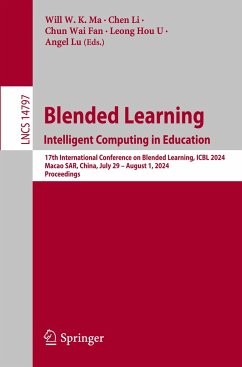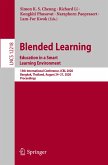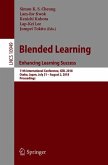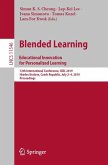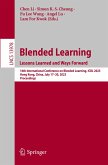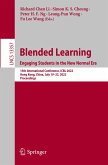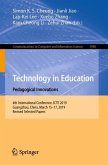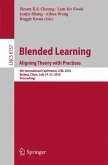Blended Learning. Intelligent Computing in Education
17th International Conference on Blended Learning, ICBL 2024, Macao SAR, China, July 29 - August 1, 2024, Proceedings
Herausgegeben:Ma, Will W. K.; Li, Chen; Fan, Chun Wai; U, Leong Hou; Lu, Angel
Blended Learning. Intelligent Computing in Education
17th International Conference on Blended Learning, ICBL 2024, Macao SAR, China, July 29 - August 1, 2024, Proceedings
Herausgegeben:Ma, Will W. K.; Li, Chen; Fan, Chun Wai; U, Leong Hou; Lu, Angel
- Broschiertes Buch
- Merkliste
- Auf die Merkliste
- Bewerten Bewerten
- Teilen
- Produkt teilen
- Produkterinnerung
- Produkterinnerung
This book constitutes the refereed proceedings of the 17th International Conference on Blended Learning. Intelligent Computing in Education, ICBL 2024, held in Macao, China, during July 29 - August 1, 2024.
The 26 papers presented in this volume were carefully reviewed and selected from 71 submissions.
The selected papers are classified into four primary themes: revolutionizing education with AI; blended learning and technological innovations; advancements in learning analytics; and innovative approaches in educational research.
Andere Kunden interessierten sich auch für
![Blended Learning. Education in a Smart Learning Environment Blended Learning. Education in a Smart Learning Environment]() Blended Learning. Education in a Smart Learning Environment62,99 €
Blended Learning. Education in a Smart Learning Environment62,99 €![Blended Learning. Enhancing Learning Success Blended Learning. Enhancing Learning Success]() Blended Learning. Enhancing Learning Success39,99 €
Blended Learning. Enhancing Learning Success39,99 €![Blended Learning: Educational Innovation for Personalized Learning Blended Learning: Educational Innovation for Personalized Learning]() Blended Learning: Educational Innovation for Personalized Learning51,99 €
Blended Learning: Educational Innovation for Personalized Learning51,99 €![Blended Learning : Lessons Learned and Ways Forward Blended Learning : Lessons Learned and Ways Forward]() Blended Learning : Lessons Learned and Ways Forward50,99 €
Blended Learning : Lessons Learned and Ways Forward50,99 €![Blended Learning: Engaging Students in the New Normal Era Blended Learning: Engaging Students in the New Normal Era]() Blended Learning: Engaging Students in the New Normal Era80,24 €
Blended Learning: Engaging Students in the New Normal Era80,24 €![Technology in Education: Pedagogical Innovations Technology in Education: Pedagogical Innovations]() Technology in Education: Pedagogical Innovations39,99 €
Technology in Education: Pedagogical Innovations39,99 €![Blended Learning: Aligning Theory with Practices Blended Learning: Aligning Theory with Practices]() Blended Learning: Aligning Theory with Practices39,99 €
Blended Learning: Aligning Theory with Practices39,99 €-
-
-
This book constitutes the refereed proceedings of the 17th International Conference on Blended Learning. Intelligent Computing in Education, ICBL 2024, held in Macao, China, during July 29 - August 1, 2024.
The 26 papers presented in this volume were carefully reviewed and selected from 71 submissions.
The selected papers are classified into four primary themes: revolutionizing education with AI; blended learning and technological innovations; advancements in learning analytics; and innovative approaches in educational research.
The 26 papers presented in this volume were carefully reviewed and selected from 71 submissions.
The selected papers are classified into four primary themes: revolutionizing education with AI; blended learning and technological innovations; advancements in learning analytics; and innovative approaches in educational research.
Produktdetails
- Produktdetails
- Lecture Notes in Computer Science 14797
- Verlag: Springer / Springer Nature Singapore / Springer, Berlin
- Artikelnr. des Verlages: 978-981-97-4441-1
- 2024
- Seitenzahl: 364
- Erscheinungstermin: 29. Juni 2024
- Englisch
- Abmessung: 235mm x 155mm x 20mm
- Gewicht: 552g
- ISBN-13: 9789819744411
- ISBN-10: 9819744415
- Artikelnr.: 70731433
- Herstellerkennzeichnung Die Herstellerinformationen sind derzeit nicht verfügbar.
- Lecture Notes in Computer Science 14797
- Verlag: Springer / Springer Nature Singapore / Springer, Berlin
- Artikelnr. des Verlages: 978-981-97-4441-1
- 2024
- Seitenzahl: 364
- Erscheinungstermin: 29. Juni 2024
- Englisch
- Abmessung: 235mm x 155mm x 20mm
- Gewicht: 552g
- ISBN-13: 9789819744411
- ISBN-10: 9819744415
- Artikelnr.: 70731433
- Herstellerkennzeichnung Die Herstellerinformationen sind derzeit nicht verfügbar.
.- Keynotes:.
.- Building a Learner-Centric Citywide Digital Literacy Ecosystem: Train-the-Trainer, Community-Based Learning, and Gifted Education.
.- Educational Technology trends in the AI era.
.- How to design scientific, happy and effective educational games: Research on educational game design from the perspective of learning sciences.
.- Blended Learning and AI: Enhancing Teaching and Learning in Higher Education.
.- Digital Literacy: Evolution, Evaluation and Enhancement.
.- Revolutionizing Education with AI:.
.- Complexities of Using Large Language Model Generative AI in Health Education and Robots (ID20).
.- New Dimensions: The Impact of the Metaverse and AI Avatars on Social Science Education (ID27).
.- Construction and Implementation of Generative AI-based Human-Machine Collaborative Classroom Teaching Model in Universities (ID46).
.- DMP_AI: An AI-Aided K-12 System for Teaching and Learning in Diverse Schools (ID64.
.- A Case Study Examines How a New Content Integration Impacts Learning Outcomes with AI Experience Inputs (ID68).
.- Blended Learning and Technological Innovations:
.- Understanding characteristics of teacher-student dialogue in urban-rural blended synchronous classroom: A learning analytics perspective (ID7).
.- Integrating a digital math vector game into a blended classroom: technological and instructional design principles (ID19).
.- K12 Blended Learning in China of "Education+" era: from the perspective of ecology (ID31).
.- AIGC empowered blended learning in university course design and implementation: A case study (ID43).
.- Exploring preschool teachers' perceived challenges in using ICT in Hong Kong after the pandemic (ID63).
.- Investigating Relationships Among Institutional Support, Perceived Technology Usefulness, Attitude Toward Using Technology and Teacher Professional Development Motivation: A Moderated Mediation Model (ID22).
.- Advancements in Learning Analytics:.
.- An Analysis of Learning Analytics Approaches for Course Evaluation (ID25).
.- Uncovering Students' Processing Tactics towards ChatGPT's Feedback in EFL Education Using Learning Analytics (ID38).
.- Enhancing EFL Learners' Knowledge of L2 Requests during Mobile-mediated Text-based and Audio-based Dynamic Assessment (ID44).
.- Investigating Learning Behaviors and Intervention Effectiveness of Students with Special Educational Needs (ID62).
.- Study on the Influencing Factors of Middle School Students' Deep Learning Competencies in the Smart Classroom Environment (ID36).
.- Innovative Approaches in Educational Research:.
.- A Study on the Design and Implementation of the Smart Site Safety System from the Stakeholders' Perspectives (ID51).
.- Enhancing Youth Creativity through Computer-Supported Collaborative Learning: A Preliminary Investigation in Rural Chinese Elementary School (ID69).
.- Leveraging deep learning for classifying learner-generated course evaluation texts (ID26).
.- Analysis of Cyber Range Scenario Design--A Case Study (ID54).
.- Capturing Teachers' Collaborative Talk Patterns in an Interdisciplinary Lesson Study: A Social Epistemic Network Signature Approach (ID39).
.- Building a Learner-Centric Citywide Digital Literacy Ecosystem: Train-the-Trainer, Community-Based Learning, and Gifted Education.
.- Educational Technology trends in the AI era.
.- How to design scientific, happy and effective educational games: Research on educational game design from the perspective of learning sciences.
.- Blended Learning and AI: Enhancing Teaching and Learning in Higher Education.
.- Digital Literacy: Evolution, Evaluation and Enhancement.
.- Revolutionizing Education with AI:.
.- Complexities of Using Large Language Model Generative AI in Health Education and Robots (ID20).
.- New Dimensions: The Impact of the Metaverse and AI Avatars on Social Science Education (ID27).
.- Construction and Implementation of Generative AI-based Human-Machine Collaborative Classroom Teaching Model in Universities (ID46).
.- DMP_AI: An AI-Aided K-12 System for Teaching and Learning in Diverse Schools (ID64.
.- A Case Study Examines How a New Content Integration Impacts Learning Outcomes with AI Experience Inputs (ID68).
.- Blended Learning and Technological Innovations:
.- Understanding characteristics of teacher-student dialogue in urban-rural blended synchronous classroom: A learning analytics perspective (ID7).
.- Integrating a digital math vector game into a blended classroom: technological and instructional design principles (ID19).
.- K12 Blended Learning in China of "Education+" era: from the perspective of ecology (ID31).
.- AIGC empowered blended learning in university course design and implementation: A case study (ID43).
.- Exploring preschool teachers' perceived challenges in using ICT in Hong Kong after the pandemic (ID63).
.- Investigating Relationships Among Institutional Support, Perceived Technology Usefulness, Attitude Toward Using Technology and Teacher Professional Development Motivation: A Moderated Mediation Model (ID22).
.- Advancements in Learning Analytics:.
.- An Analysis of Learning Analytics Approaches for Course Evaluation (ID25).
.- Uncovering Students' Processing Tactics towards ChatGPT's Feedback in EFL Education Using Learning Analytics (ID38).
.- Enhancing EFL Learners' Knowledge of L2 Requests during Mobile-mediated Text-based and Audio-based Dynamic Assessment (ID44).
.- Investigating Learning Behaviors and Intervention Effectiveness of Students with Special Educational Needs (ID62).
.- Study on the Influencing Factors of Middle School Students' Deep Learning Competencies in the Smart Classroom Environment (ID36).
.- Innovative Approaches in Educational Research:.
.- A Study on the Design and Implementation of the Smart Site Safety System from the Stakeholders' Perspectives (ID51).
.- Enhancing Youth Creativity through Computer-Supported Collaborative Learning: A Preliminary Investigation in Rural Chinese Elementary School (ID69).
.- Leveraging deep learning for classifying learner-generated course evaluation texts (ID26).
.- Analysis of Cyber Range Scenario Design--A Case Study (ID54).
.- Capturing Teachers' Collaborative Talk Patterns in an Interdisciplinary Lesson Study: A Social Epistemic Network Signature Approach (ID39).
.- Keynotes:.
.- Building a Learner-Centric Citywide Digital Literacy Ecosystem: Train-the-Trainer, Community-Based Learning, and Gifted Education.
.- Educational Technology trends in the AI era.
.- How to design scientific, happy and effective educational games: Research on educational game design from the perspective of learning sciences.
.- Blended Learning and AI: Enhancing Teaching and Learning in Higher Education.
.- Digital Literacy: Evolution, Evaluation and Enhancement.
.- Revolutionizing Education with AI:.
.- Complexities of Using Large Language Model Generative AI in Health Education and Robots (ID20).
.- New Dimensions: The Impact of the Metaverse and AI Avatars on Social Science Education (ID27).
.- Construction and Implementation of Generative AI-based Human-Machine Collaborative Classroom Teaching Model in Universities (ID46).
.- DMP_AI: An AI-Aided K-12 System for Teaching and Learning in Diverse Schools (ID64.
.- A Case Study Examines How a New Content Integration Impacts Learning Outcomes with AI Experience Inputs (ID68).
.- Blended Learning and Technological Innovations:
.- Understanding characteristics of teacher-student dialogue in urban-rural blended synchronous classroom: A learning analytics perspective (ID7).
.- Integrating a digital math vector game into a blended classroom: technological and instructional design principles (ID19).
.- K12 Blended Learning in China of "Education+" era: from the perspective of ecology (ID31).
.- AIGC empowered blended learning in university course design and implementation: A case study (ID43).
.- Exploring preschool teachers' perceived challenges in using ICT in Hong Kong after the pandemic (ID63).
.- Investigating Relationships Among Institutional Support, Perceived Technology Usefulness, Attitude Toward Using Technology and Teacher Professional Development Motivation: A Moderated Mediation Model (ID22).
.- Advancements in Learning Analytics:.
.- An Analysis of Learning Analytics Approaches for Course Evaluation (ID25).
.- Uncovering Students' Processing Tactics towards ChatGPT's Feedback in EFL Education Using Learning Analytics (ID38).
.- Enhancing EFL Learners' Knowledge of L2 Requests during Mobile-mediated Text-based and Audio-based Dynamic Assessment (ID44).
.- Investigating Learning Behaviors and Intervention Effectiveness of Students with Special Educational Needs (ID62).
.- Study on the Influencing Factors of Middle School Students' Deep Learning Competencies in the Smart Classroom Environment (ID36).
.- Innovative Approaches in Educational Research:.
.- A Study on the Design and Implementation of the Smart Site Safety System from the Stakeholders' Perspectives (ID51).
.- Enhancing Youth Creativity through Computer-Supported Collaborative Learning: A Preliminary Investigation in Rural Chinese Elementary School (ID69).
.- Leveraging deep learning for classifying learner-generated course evaluation texts (ID26).
.- Analysis of Cyber Range Scenario Design--A Case Study (ID54).
.- Capturing Teachers' Collaborative Talk Patterns in an Interdisciplinary Lesson Study: A Social Epistemic Network Signature Approach (ID39).
.- Building a Learner-Centric Citywide Digital Literacy Ecosystem: Train-the-Trainer, Community-Based Learning, and Gifted Education.
.- Educational Technology trends in the AI era.
.- How to design scientific, happy and effective educational games: Research on educational game design from the perspective of learning sciences.
.- Blended Learning and AI: Enhancing Teaching and Learning in Higher Education.
.- Digital Literacy: Evolution, Evaluation and Enhancement.
.- Revolutionizing Education with AI:.
.- Complexities of Using Large Language Model Generative AI in Health Education and Robots (ID20).
.- New Dimensions: The Impact of the Metaverse and AI Avatars on Social Science Education (ID27).
.- Construction and Implementation of Generative AI-based Human-Machine Collaborative Classroom Teaching Model in Universities (ID46).
.- DMP_AI: An AI-Aided K-12 System for Teaching and Learning in Diverse Schools (ID64.
.- A Case Study Examines How a New Content Integration Impacts Learning Outcomes with AI Experience Inputs (ID68).
.- Blended Learning and Technological Innovations:
.- Understanding characteristics of teacher-student dialogue in urban-rural blended synchronous classroom: A learning analytics perspective (ID7).
.- Integrating a digital math vector game into a blended classroom: technological and instructional design principles (ID19).
.- K12 Blended Learning in China of "Education+" era: from the perspective of ecology (ID31).
.- AIGC empowered blended learning in university course design and implementation: A case study (ID43).
.- Exploring preschool teachers' perceived challenges in using ICT in Hong Kong after the pandemic (ID63).
.- Investigating Relationships Among Institutional Support, Perceived Technology Usefulness, Attitude Toward Using Technology and Teacher Professional Development Motivation: A Moderated Mediation Model (ID22).
.- Advancements in Learning Analytics:.
.- An Analysis of Learning Analytics Approaches for Course Evaluation (ID25).
.- Uncovering Students' Processing Tactics towards ChatGPT's Feedback in EFL Education Using Learning Analytics (ID38).
.- Enhancing EFL Learners' Knowledge of L2 Requests during Mobile-mediated Text-based and Audio-based Dynamic Assessment (ID44).
.- Investigating Learning Behaviors and Intervention Effectiveness of Students with Special Educational Needs (ID62).
.- Study on the Influencing Factors of Middle School Students' Deep Learning Competencies in the Smart Classroom Environment (ID36).
.- Innovative Approaches in Educational Research:.
.- A Study on the Design and Implementation of the Smart Site Safety System from the Stakeholders' Perspectives (ID51).
.- Enhancing Youth Creativity through Computer-Supported Collaborative Learning: A Preliminary Investigation in Rural Chinese Elementary School (ID69).
.- Leveraging deep learning for classifying learner-generated course evaluation texts (ID26).
.- Analysis of Cyber Range Scenario Design--A Case Study (ID54).
.- Capturing Teachers' Collaborative Talk Patterns in an Interdisciplinary Lesson Study: A Social Epistemic Network Signature Approach (ID39).

